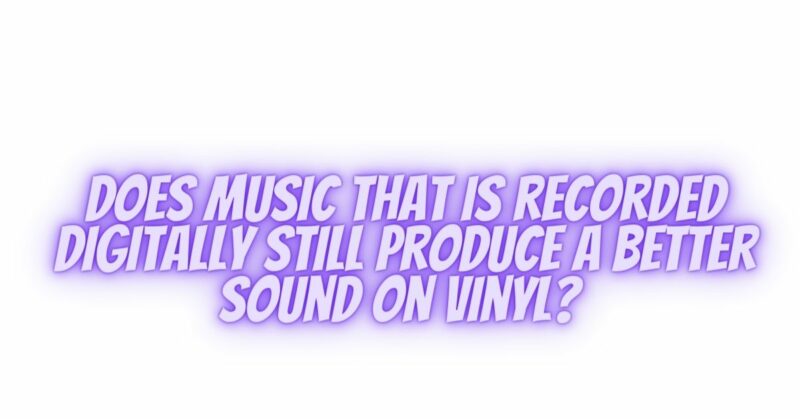The debate over whether music recorded digitally sounds better on vinyl records is a topic that has sparked considerable discussion among audiophiles and music enthusiasts. To understand this complex issue, we need to delve into the characteristics of digital and vinyl audio, as well as the factors that influence how music is experienced on each format.
The Digital vs. Vinyl Debate:
Digital Audio (CDs, Streaming, and Digital Downloads):
- Precision and Clarity: Digital recordings are known for their precision and clarity. They capture a wide frequency range and provide low noise levels, resulting in a clean and faithful reproduction of the original sound.
- Dynamic Range: Digital recordings can handle a broad dynamic range, allowing for both soft and loud passages with minimal distortion.
- Consistency: Digital audio is consistent and immune to many of the imperfections that can affect analog formats, such as vinyl.
Vinyl Records:
- Analog Warmth: Vinyl records are cherished for their “analog warmth.” This characteristic often involves subtle distortions, imperfections, and harmonic overtones that can impart a unique and pleasing character to the music.
- Physical Interaction: The analog nature of vinyl involves physical contact between the stylus (needle) and the grooves, resulting in a tactile and tangible connection to the music.
- Artistic Experience: Vinyl records are prized for their larger album artwork and tactile nature, providing a more immersive and artistic experience for listeners.
Factors Influencing Sound Quality on Vinyl:
The sound quality of music on vinyl records can be influenced by several factors:
- Vinyl Mastering: The mastering process for vinyl is distinct from digital formats. Engineers must make adjustments to ensure the music can be accurately reproduced on vinyl, considering factors like groove spacing and low-frequency limitations.
- Vinyl Pressing Quality: The quality of vinyl pressings varies, and poorly pressed records can introduce surface noise and imperfections.
- Turntable and Cartridge Quality: The quality of your turntable, tonearm, and cartridge significantly affects the playback quality of vinyl records.
- Playback Environment: The listening environment, including the quality of speakers or headphones, room acoustics, and external noise, plays a crucial role in the perceived sound quality.
The Subjective Nature of Sound Quality:
Sound quality is highly subjective, and what sounds better to one person may not be the same for another. Some listeners prefer the pristine clarity of digital recordings, while others appreciate the unique character and warmth of vinyl. It’s important to recognize that both formats have their strengths and limitations.
Conclusion:
Whether music recorded digitally sounds better on vinyl depends on individual preferences and the specific qualities one seeks in their music experience. Some people enjoy the nostalgia, tactile engagement, and analog warmth of vinyl records, while others prefer the precision and convenience of digital audio. Ultimately, the “better” format is a matter of personal taste, and the joy of music is found in the diverse ways it can be experienced and appreciated.


